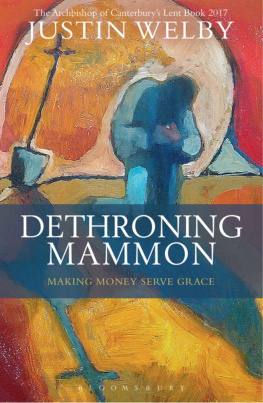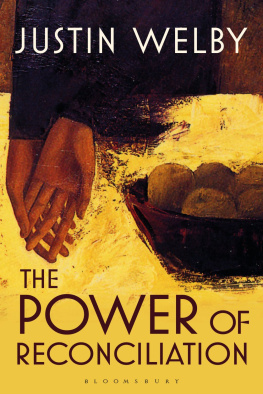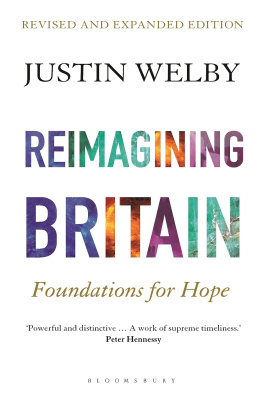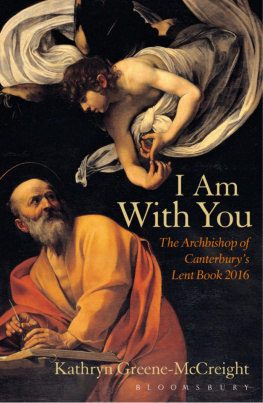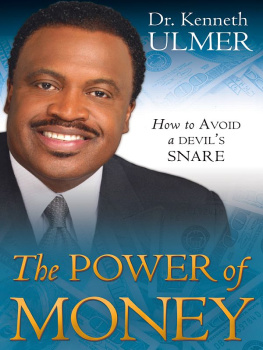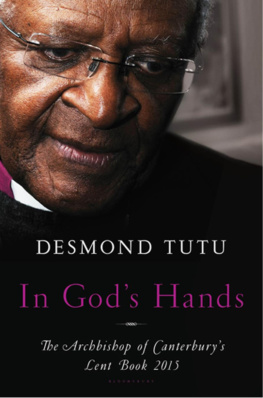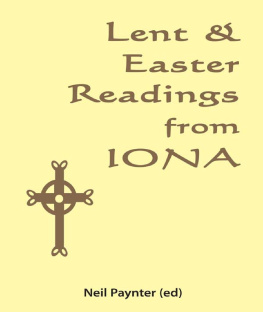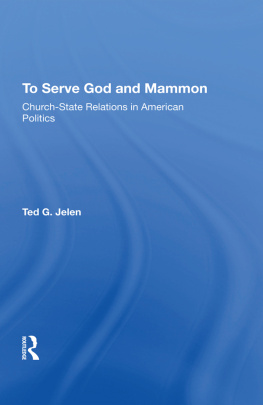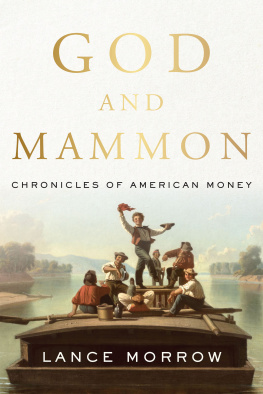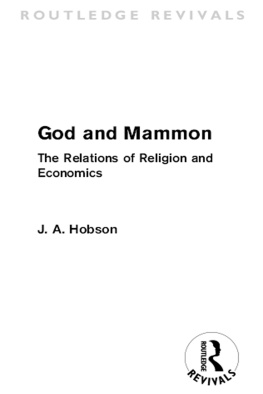
DETHRONING MAMMON
To Caroline
DETHRONING
MAMMON
MAKING MONEY SERVE GRACE
The Archbishop of Canterburys Lent Book 2017
Justin Welby

This is a beautiful and important book to accompany people as they walk through Lent towards the poverty of Jesus on the cross and his subsequent resurrection. Last Lent a young assistant with no religious faith living in LArche asked me, What is Lent all about? I replied that it is a time where we think about all the poor and lonely people of the world, refugees and the elderly, prisoners and those controlled by addiction. It is a time for addressing the barriers that divide us from one another. That is a good idea, he replied.
Perhaps the greatest divide today is between the poor and the rich. It is a great and terrible divide, so wide that those on either side cannot even imagine its breadth. Those of us who have cars, who easily afford a plane ticket, who frequently purchase new clothes and have our food shipped from many different continents to our plate, cannot imagine the lives of those who have none of that available to them. And yet, our decisions, our consumption, have resounding effects upon everyone on this planet.
And some of these effects are amounting to crises. Ecological destruction, religious extremism, violent political regimes these all have some roots in greed and the impetus to have more and more and more.
So the question of Mammon is pressing. But what is it? In this little book, Archbishop Welby wisely dissects the defining characteristics of Mammon. They infiltrate our day-to-day lives with such subtle discretion that we may not even be aware of Mammons pervasive presence. If we are aware, then every day, in little ways, we can immediately begin this urgent process of dethroning Mammon, of making room for Jesus.
In many ways, LArche, the community I have lived in for over half a century, is the antithesis of Mammon. My community, like nearly one hundred and fifty others in the world, is composed of men and women, with and without intellectual disabilities, living together. Part of our mission is to make known the gifts of people with an intellectual disability. But another profound vocation of LArche is to welcome young assistants who have often lived unquestioningly guided by Mammon, by competition and efficiency and productivity. That is the reality of our society today. In LArche, they discover something very different. Those who have no value in society are the centre of our community. Our way of life together allows for the spontaneous, the creative, the inherently human to shine through. And competition quickly disintegrates into play and cooperation because each person is unique and gifted and beyond compare. Some have called LArche a school of the heart. What is true is that many of the lessons revealed in this book by Archbishop Welby are enacted (often unintentionally) in LArche. I would even go so far as to suggest that people with an intellectual disability have an amazing gift for dethroning Mammon.
I greatly appreciate this book and the journey it leads us on through Lent. As I explained to that young assistant, Lent is a time of compassion, but it is especially a time of preparation and liberation. Some people give up sweets or coffee, a symbol of giving up what appears essential in our lives so that Jesus can once again become central. This book is also about liberation. It is about freeing ourselves from the principles and spirit that amount to Mammon, freeing ourselves to be true disciples of Jesus. Let us prepare together for that ultimate liberation which is Easter, Jesus resurrected and alive today.
Jean Vanier
June 2016
Key text Matthew 13:45-6
The Parable of the Pearl of Great Value
Jesus Christ sets us free through obedience to him. Serving Christ is no slavery in the way we understand the term, but an entry into the most beautiful and glorious freedom. He does not use underhand means to gain power, but lures us into ever more beauty and purpose, ever-deeper relationships and self-realisation, simply by the power of his compelling and unconditional love.
But the more interconnected the world becomes, the more power is held over individuals and nations by economics, by money and flows of finance. Mammon a name given by Jesus to this force gains strength through our obedience. The more we let ourselves be governed by Mammon, the more power he has, and the more the vulnerable suffer.
It is that extraordinary contrast, between Mammon and Christ, that has made me want to write this book. In so many human crises, money plays a part. Debt and desire for things enslaves many people I know, and draws them into lives that are in the service of Mammon, a master they neither choose nor want, but who tricks them by playing on insecurities, on good intentions and on reasonable ambitions. At a national and international level, every crisis seems to end in talk about economics not economics as a tool in the service of human flourishing, but as an end in itself. It seems that in many eyes, and often in mine, personal finances that are in good shape, or a national or global economy doing well, are not merely a means to improve peoples lives, but are seen as the goal in pursuit of a good life.
That approach is incompatible with serving Christ. It is incompatible, yet God, in grace and love and patience, meets us, blesses us, calls us and guides us, even while we are possessed by the power of Mammon. God waits for us to find the real treasure in life, and to begin the incredibly radical steps the first steps in a journey that will last a lifetime to bring us to the point of losing everything for the sake of the treasure of the Kingdom of Heaven.
MATTHEW 13:45-6
Again, the kingdom of heaven is like a merchant in search of fine pearls; 46on finding one pearl of great value, he went and sold all that he had and bought it.
Jesus talks about the kingdom of heaven in numerous parables, and in Matthew 13 there is a great series of them. In vv. 45-6, we have the parable of the pearl of great price. It is a striking parable because it concerns a merchant, someone accustomed to doing good deals, someone that Jesus hearers would have recognised as canny, as they say in northeast England. The merchant buys and sells pearls as a business, until one day he finds a pearl of pearls, more beautiful, more valuable than any other. He is entranced with it. He sells everything he has and buys it. The parable is very short indeed, but vivid in the extreme. One of the first rules of business is that one should never bet everything on one deal, but should hedge ones bets. Yet here is this clever businessman doing just that. We dont have any idea what comes next what happens to the pearl but now the merchant has it as his own. The image on the front of this book is a profound and striking depiction of this scene.
In some interpretations of the parable, the merchant represents the believer, who, after much seeking and finding of good things, finds that uniquely great thing, the kingdom of heaven. In Matthews Gospel the phrase is used to convey the idea of the area of Gods rule. We enter it only by surrendering to the King, Jesus himself. The merchant recognises that everything else he has held on to is worth nothing compared to this treasure, and that nothing is worth keeping if it stops him getting hold of the pearl of great value.
But the parable can be understood in another way; the merchant is God, who demonstrates that he will hold nothing back in order to claim that which is most precious. The pearl of great value represents you and me for whom God gives up his only Son in order that we may know ourselves as loved, claimed, belonging, held close to Gods heart as his most valued treasure.
Next page
